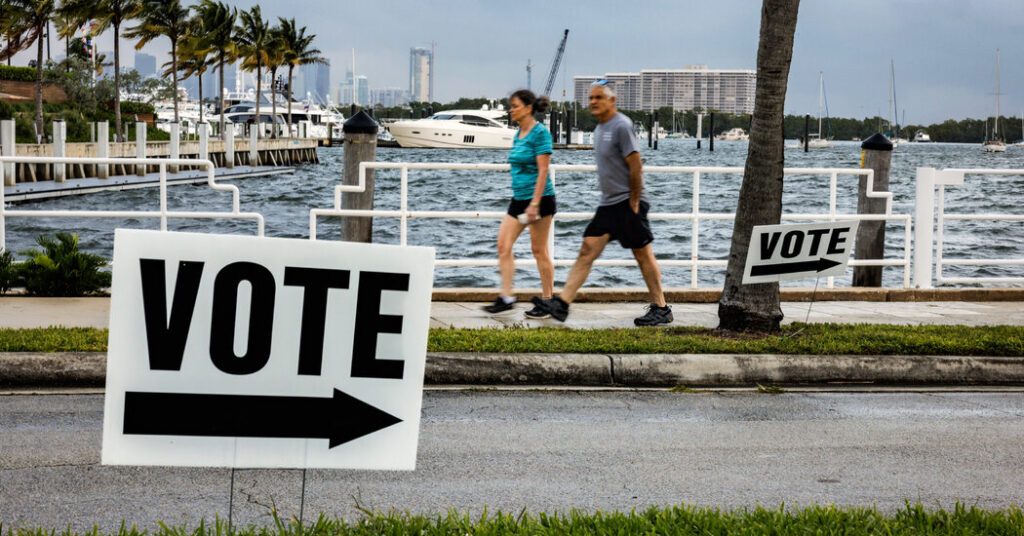After a wave of successful citizen-led efforts to expand abortion rights via ballot measures, some state legislatures are making it harder for members of the public to put such measures before voters.
Florida, which late last week became the latest state to enact stricter rules around the process, is already facing a lawsuit over whether imposing more restrictions on the ballot initiative process is constitutional. The suit was brought by a group, Florida Decides Healthcare, that is trying to get a proposal on next year’s ballot to expand Medicaid in the state.
The group, which faces a February deadline to collect nearly 900,000 signatures from residents supportive of the plan, said that the new law was making signature-gatherers nervous.
The law imposes a possible criminal penalty if someone circulating petitions does not register with the state; limits to 25 the number of signatures that an unregistered canvasser can collect; requires canvassers to collect more identifying information, and shortens the time frame for petition submission to 10 days after signatures are received.
“This isn’t about transparency or accountability — this is about control,” said Holly Bullard, the co-chairwoman of the organization that sued. The citizen-led process, she added, “is not perfect, but it’s powerful. And that’s exactly why they’re trying to undermine it.”
Gov. Ron DeSantis, in a post on social media, said that the bill, which he signed on Friday, would “combat petition fraud and prevent the special interest abuse of our constitutional amendment process.” A report compiled by the state’s Office of Election Crimes and Security charged that some of the organizers and petitioners behind last year’s abortion ballot question had committed “widespread petition fraud.” But the state did not challenge any signatures earlier in the year, when it had a chance to.
Less than half of the nation’s 50 states allow for citizens to collect signatures and to place proposals on the ballot. State legislatures can also put questions on the ballot, and typically author the overwhelming majority of constitutional amendments.
But after the fall of Roe v. Wade in 2022 allowed states to restrict abortion access, abortion rights groups turned to the ballot initiative process as a way to circumvent conservative legislatures and to put the question of abortion access directly before voters.
The new restrictions in Florida are similar to several that were approved last month in Arkansas, where petitioners almost succeeded in getting an abortion rights amendment on the ballot last year. The Republican-led state had recently required that a certain minimum of signatures be obtained in at least 50 of its 75 counties, more than double the previous threshold.
Among the new requirements in Arkansas are that organizers request photo identification from prospective signers, and that canvassers must be permanent residents of the state. Both are already facing legal challenges.
Other states that have sought to tighten the rules include North Dakota, where a resolution that passed last month raises the threshold of voter support to 60 percent for a ballot initiative to pass, and South Dakota, where voters in the next general election will decide whether to enact the same change.
In South Dakota, however, Gov. Larry Rhoden, a Republican, vetoed a bill that would have imposed tougher geographic requirements for signature collection.
In Florida, proposed constitutional amendments expanding abortion rights and legalizing recreational marijuana measures narrowly failed last fall, even though more than half of voters supported them. The state requires 60 percent of voters to approve such measures for them to become law.
Citizen-led abortion rights proposals were successful in more than half a dozen states, including more conservative states like Ohio and Kansas. Some states raised the threshold for signature collection and added requirements as to where at least some signatures should be collected to ensure a fair geographic representation. At least one, Nevada, requires a majority of voters to approve a proposed amendment in two consecutive elections for it to become law.
The citizen initiative process has been used repeatedly in Florida to get initiatives passed despite strong opposition from the state’s conservative leadership. Voters in 2016 approved a proposal to create a medical marijuana program, and another to restore voting rights to as many as 1.5 million people with felony convictions. (After the voting rights measure passed in 2018, the legislature sharply curtailed it.)
“These are not completely new, but the magnitude of the attacks has definitely grown,” Alice Clapman, a senior counsel in the Brennan Center’s Voting Rights and Elections program, said of legislative efforts to toughen the parameters around the amendment process.
She questioned why adding more rules was necessary in Florida, where the 60 percent threshold for passage has remained a barrier for many initiatives.
Mitch Smith contributed reporting.


